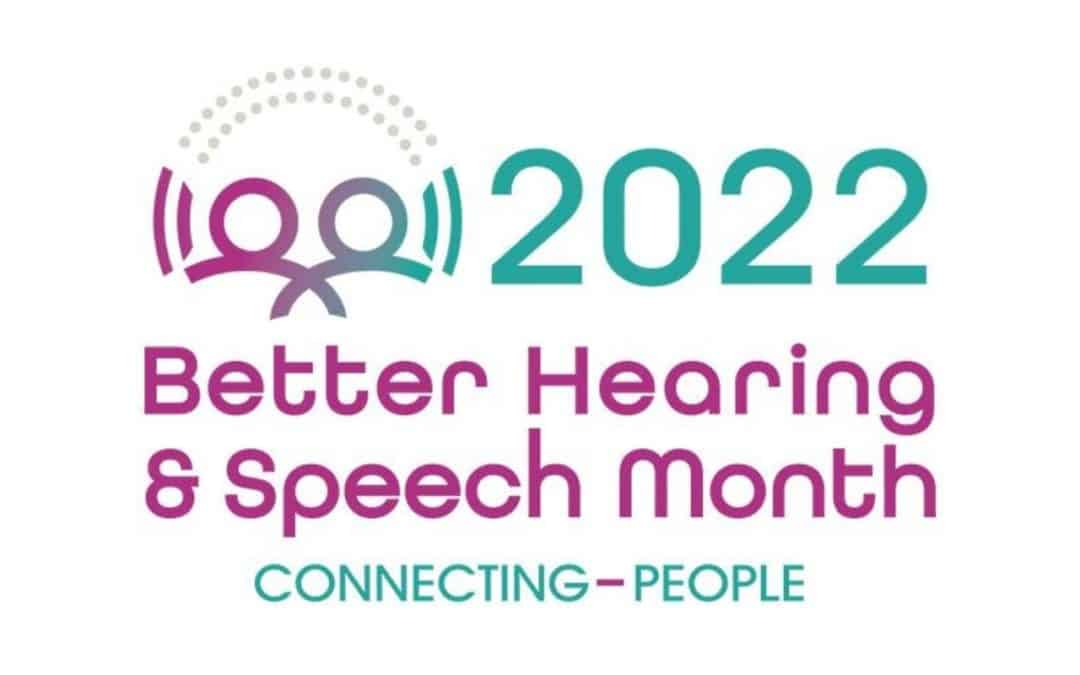May is Better Hearing and Speech Month! You may be wondering what that means and we are excited to share. Organized by the American Speech-Language-Hearing Association, this campaign focuses on raising awareness about hearing loss – the third most common chronic medical condition people experience today. Over 48 million people have some degree of imapired hearing, a pervasive health issue that has multifaceted effects.
Though hearing loss is incredibly common – affecting some 1 in 6 people – it remains underdiagnosed. It is estimated that only one third of people who could benefit from hearing loss treatment actually receive it. So the theme of this year’s Better Hearing and Speech Month is Connecting People which emphasizes the wide range of hearing healthcare services and resources that are available for you and the betterment of your health.
Benefits of Treating Hearing Loss
The impact of untreated hearing loss goes beyond hearing. Hearing is a major way we exist and move through the environments we inhabit on a daily basis. It is essential for communication which is integral to relationships, social engagement, work life and much more. So when hearing is imapired, the consequences are far reaching. Fortunately, seeking treatment alleviates symptoms and the consequences of hearing loss that remains untreated. Treatment offers life-changing benefits including:
- Strengthens communication: the most common treatment used to effectively manage hearing loss is hearing aids. These are electronic devices that are designed to absorb, amplify, adn process sound. This alleviates symptoms and increases one’s capacity to hear, allowing people to smoothly navigate communication. People are more able to actively participate in conversations and have dynamic interactions without the barriers of hearing loss symptoms.
- Improves relationships: strengthened communication also improves relationships in several ways. People often report feeling unheard or ignored by their loved one with untreated hearing loss. But treating hearing loss provides the support needed to be more present and engaged in conversations. People are more able to readily hear and respond which creates the conditions for effective communication. Hearing aids help people spend quality time with others which fosters connection, intimacy, and closeness.
- Supports active social life: hearing aids are especially helpful in environments that can be more challenging to hear in, including social settings. Hearing aids equip people with the support needed to navigate social environments and conversations with greater ease. They enhance sound quality and speech comprehension in these settings which allow people to be more comfortable and engaged, supporting an active social life.
- Improves overall health: extensive research shows that treating hearing loss reduces the risk of developing other health conditions. This includes cognitive decline and related conditions like Alzheimer’s as well as depression and accidental injuries. Hearing aids strengthen cognitive functions, increase spatial awareness, and boost wellness.
Treating hearing loss helps people thrive and live more satisfying as well as fuller lives. Treatment improves relationships, communication, social life, adn health which is key to living a quality and fulfilling life.
Connecting to Hearing Healthcare
There are numerous resources and hearing healthcare services that you can access to support your hearing health. The first step is to have your hearing evaluated by a hearing healthcare specialist. Hearing tests involve a noninvasive and painless process that thoroughly evaluates your hearing abilities in both ears. This identifies any hearing loss and the degree of impairment you could be experiencing. Once your hearing needs are established, your hearing healthcare provider is able to recommend effective treatment options to meet those needs.
Hearing aids are the most common way hearing loss is treated. Today’s hearing aids are more advanced and savvy than ever before. There is a wide range of options, styles, and features that enhance connectivity and sound quality. Your hearing healthcare provider will help you navigate your options and will use several important factors to help you select a device that will meet your hearing and lifestyle needs. In addition to diagnostics and hearing aid fittings, there are other hearing healthcare services that you can benefit from. This includes accessing other hearing technologies, therapy for specific symptoms like tinnitus, as well as hearing aid maintenance services.
Prioritize Your Hearing Health this May
This month is a great time to prioritize your hearing health. You can do this by contacting us today to schedule an appointment for a hearing consultation. We look forward to getting to know you and helping you transform your hearing health!

